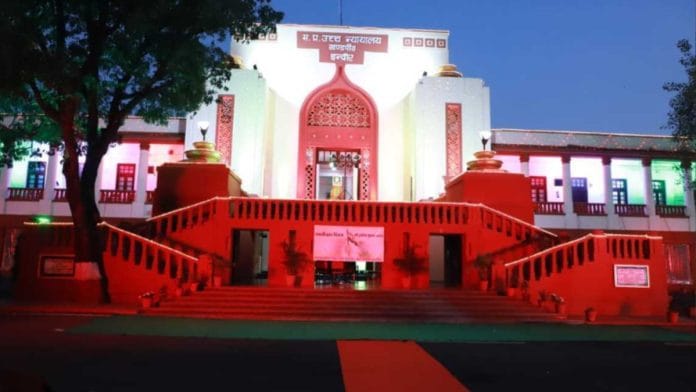New Delhi: The Madhya Pradesh High Court has expressed concern over disparity of treatment meted out to government employees and called upon the cabinet ministers to look into why Class III and IV employees were being harassed by higher officials.
While Class III government employees include higher-grade assistants, stenographers, assistants, cashiers, projectionists, and clerks, among others, accountants, cleaning staff, peons, and chowkidars (guards) are put under the category of Class IV employees.
“We have come across various cases, in which Class IV employees of various departments of Madhya Pradesh are affected by the decision taken by superiors. Most of the cases are of the nature of withdrawal of pay scale upgradation, recovery at the time of retirement and non-grant of similar benefits to remaining employees and delay in promotion etc,” a bench of Justices Vivek Rusia and Gajendra Singh said in its 25 February ruling.
“Therefore, the Cabinet of ministers should consider why Class III and IV employees are being victimised” owing to the “wrong and adamant approach of higher officials of the concerned department” to stop the harassment of these employees and save the court’s time, the Indore bench said.
The observations came while it dismissed the MP government’s plea challenging a 2022 order wherein a single-judge HC bench quashed the decision to recover an amount of Rs 94,056 from a skilled worker.
The court also noted the reluctance of officers of Classes I and II to approach the high court in such cases. “We have not come across any cases in which Class I & II officers are approaching this high court in these types of litigation,” it said.
Pulling up the state government for wasting the court’s time, in its five-page order, it also highlighted a provision of the 2018 litigation policy which allows the administration to constitute committees at various levels to settle petty disputes.
These disputes “are not liable” to come to the high court, the court noted. “It appears that the said policy is lying in the files and gathering dust.”
Also Read: Why Punjab & Haryana HC fined itself Rs 25,000 over delay of a widow’s pension
What was the litigation policy
The Madhya Pradesh State Litigation Management Policy, 2018, was aimed at modifying its older policy from 2011. The notification said the policy was introduced to effectively manage litigation and tackle the issue that the MP government was the predominant litigant, contributing to a substantial chunk of pending cases.
The policy highlighted the Supreme Court’s view that the government and statutory authorities should be “model litigants”, given that they discharge statutory functions in public interest, It said that the government should refrain from filing false and frivolous cases that block the path of justice.
The policy is binding for all government departments, statutory bodies and Public Sector Undertakings (PSUs), directly or indirectly involved in litigation. It is also mandatory for both existing and retired employees.
It also includes provisions for the setting up of grievance redressal committees at the state, district, and national levels to prevent or control avoidable litigation, cautioning government counsel and pleaders against unnecessary adjournments.
“We have not come across any of the matters in which such policy was applied,” the bench said, lamenting its lack of implementation.
Challenge to 2022 order: the present case
According to the 2022 HC order, in 2008, the respondent, Balwant Singh Mandloi, a retired skilled worker in a government department, was recommended for a higher pay scale.
Nearly nine years later, when Mandloi retired from service in 2017, the amount of over Rs 94,000 was recovered from his retiral dues. In 2022, a single-judge bench directed that the recovery of the Rs 94,056 be quashed.
In the February 2025 order, the Indore bench noted that the “issue in respect of the grant of benefit of higher pay scale and recovery had been put to rest way back in the year 2017-18”.
Therefore, the court expressed surprise that the issue had come before it again; this time with a delay of 711 days.
In 2017, in a similar case, the court allowed a batch of petitions from skilled workers, saying they were “rightly granted” the benefit of a higher pay scale after completing several years of service. The government’s challenge to these pleas was dismissed in 2018.
“There is no explanation as to how this writ appeal can be entertained on merit that too with an unexplained delay of 711 days. The present writ appeal has been filed by wasting the public money only and to waste the valuable time of this court,” the bench said.
It also imposed a cost of Rs 20,000 on the chief engineer, Bhopal, for issuing an order in December 2024, appointing an officer-in-charge and directing him to file the plea.
“The cost shall be recovered from the Chief Engineer, Public Health Engineering Department, Bhopal who gave an opinion to file the writ appeal without examining the facts and law involved in this case,” the court said, while noting the chief engineer’s lack of care while filing the appeal.
Noting that Mandloi was a retired Class-IV employee, the court said that it was dismissing the government’s appeal on the basis of the law laid down by the Supreme Court in the State of Punjab & Others vs Rafiq Masih.
In the above-mentioned case, the top court had said that it would be “iniquitous and arbitrary” for an employer to require an employee to refund the wages of a higher post, against which he had wrongfully been permitted to work.
The apex court had also specified certain situations where recovery would be impermissible in law, such as from retired or Class III and Class IV service employees.
(Edited by Sanya Mathur)
Also Read: Despite 3 SC orders, Bihar, Jharkhand owe employees of undivided Bihar Rs 500 cr. Inside 25-yr feud






